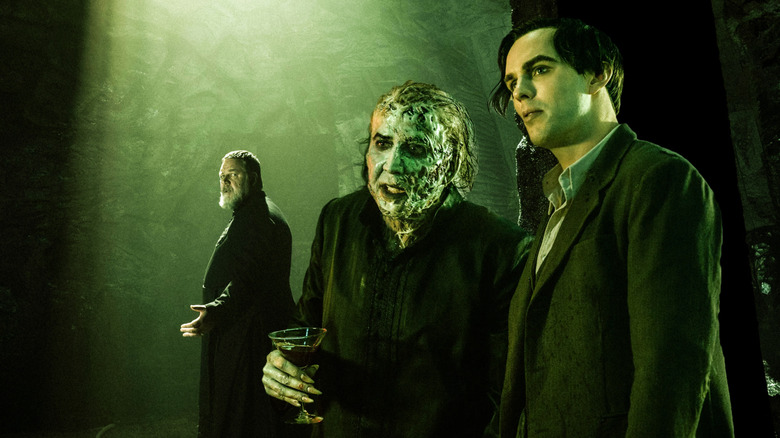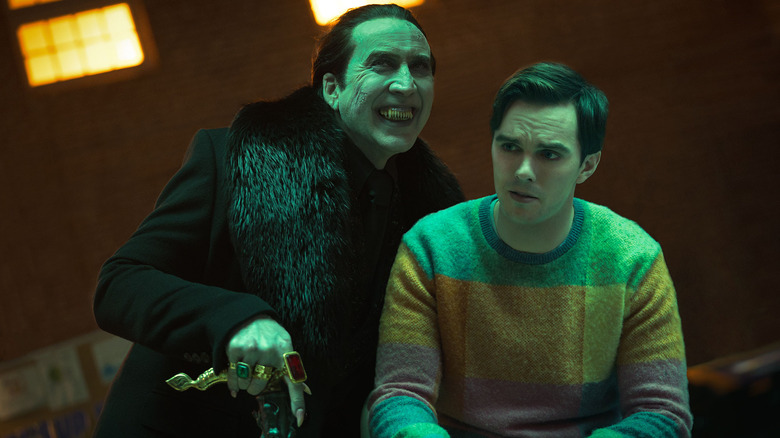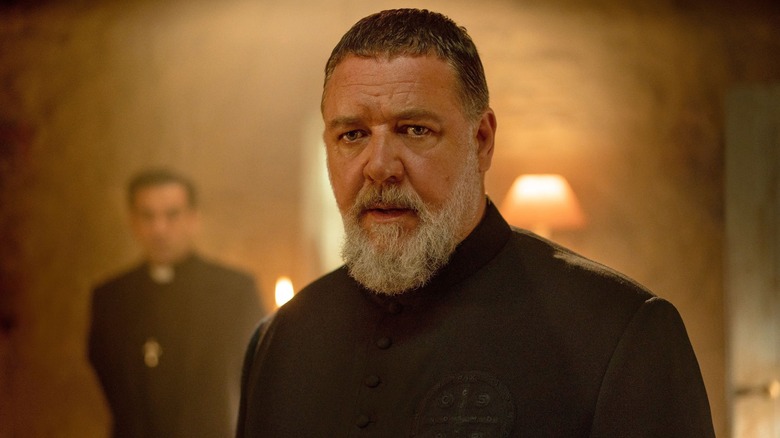Renfield Lost To The Pope's Exorcist At The Box Office — What That Says About The State Of Horror Movies
It was a pretty big weekend at the box office for horror films, as both "Renfield" and "The Pope's Exorcist" hit theaters with Universal and Sony, respectively, looking to capitalize on moviegoers who enjoy vampires and/or possessions. Alas, neither of them stood a chance against the might of "The Super Mario Bros. Movie," which is now the biggest movie of the year worldwide. Be that as it may, one of them managed to find a sizable enough audience while another instantly found itself square in the middle of Bombsville.
"The Pope's Exorcist," which stars Russell Crowe, came in second over the weekend with a $9 million haul, per The Numbers. Given that the film carries an $18 million budget, that's not a bad start. It's not a great start, but it's certainly not a bad one. It's a middle-of-the-road horror movie that worked as counterprogramming against a family-friendly blockbuster. Considering that it has already earned $27.4 million internationally for a $36.4 million global total, Sony has every reason to believe it will be money well spent when all is said and done.
Meanwhile, "Renfield" absolutely tanked against expectations. Starring Nicolas Cage as Dracula, the film came in fifth in its opening weekend, also losing to "John Wick: Chapter 4" and Ben Affleck's "Air." The action-heavy horror/comedy opened to a mere $7.7 million, which is an absolutely brutal result given that it carries a pretty sizable $65 million budget. Director Chris McKay's latest also earned a mere $2.26 million in several international markets, giving Universal's latest a $10 million global start.
No two ways about it, this is a disastrous result and one that tells us an awful lot about horror movies as a whole right now.
Renfield was a bad bet on multiple fronts
There is a real tragedy to "Renfield" performing as poorly as it did, as this was Cage's first studio movie since "Ghost Rider: Spirit of Vengeance," leading him down his rather rough decade or so largely doing direct-to-video schlock (with some fantastic exceptions). However, in the aftermath of acclaimed performances in films like "Pig," the tide started turning and he got the chance to chew the scenery as Dracula in a big-budget film. While Cage's performance has largely received acclaim, the movie itself has not. Unfortunately, we're a long way from Cage being a big draw at the box office unto himself, capable of ruling an entire summer as he did in 1997 with "Face/Off" and "Con Air" back-to-back.
"Renfield" currently sits a 59 percent on Rotten Tomatoes, with a slightly better 81 percent audience score. It also carried a B- Cinemascore, suggesting word of mouth will be pretty bad on this one. Especially since horror fans have "Evil Dead Rise" to look forward to this upcoming weekend. So, by and large, it seems that the pitch of looking at Dracula's longtime assistant in the modern world against an action-y backdrop may not have been the right play. In short, straight-up horror is far easier to sell.
Beyond that, horror comedies have always been a tough sell, with "Ghostbusters" serving as more of the exception and not the rule in this arena. That being the case, spending $65 million on this movie — nearly the budget of "It Chapter Two" — seems ill-advised at best. At worst, it was outright buffoonery. Horror often works because of the relatively low risk associated with lower budgets. At that price, the rules of horror being generally bankable go out the window.
The Pope's Exorcist was an easier sell
As for director Julius Avery's exorcism flick, it was clearly an easier sell to a slightly larger audience. Horror fans kind of know what they're going to get with an exorcism flick, particularly one so connected to the church — in this case the Pope himself. On the flip side, "Renfield" was asking audiences to buy into a pretty unique premise with Universal trying to sell a few different things all at once. It didn't work.
"The Pope's Exorcist" received similarly mixed reviews at 48 percent on Rotten Tomatoes (read our review here) but with an 83 percent audience score. Marginally more crowd-pleasing, it seems, and again, much easier to pitch to the masses. More than anything, Sony didn't overspend with this one, as that $18 million budget is the movie's biggest asset. At that budget range, you don't need to make nearly $200 million worldwide just to break even. Somewhere around $75 million (give or take) would probably be considered a win, especially since this is the exact kind of movie that will absolutely find an audience on VOD and streaming.
Another interesting thing to consider is that these movies probably cannibalized one another's audiences to a degree. One horror film could probably work just fine as counterprogramming against the likes of "The Super Mario Bros. Movie," "Air," and "John Wick 4." But with both of these movies coming out on the same day? They almost certainly started to eat one another's lunch. Sony played it smart on the business side of things and came out with a winner as a result. Universal, meanwhile, has to go back to the drawing board with its monster films.
So sure, horror may be booming right now, but that only extends so far.


